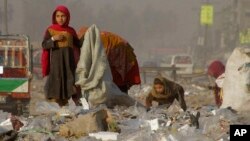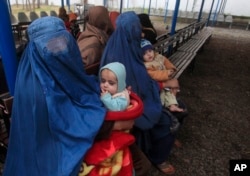The United Nations says it is “eagerly awaiting” Pakistan's solution on the status of around 1.5 million Afghan refugees in the country, insisting they continue to need asylum and protection.
Pakistan hosts an additional estimated one million Afghans living as illegal economic migrants. The refugee population is the world’s largest long-term displacement, according to the U.N. refugee agency (UNHCR). Most of them fled decades of conflict in Afghanistan.
UNHCR wants Islamabad to renew the so-called Proof of Registration (PoR) cards for registered Afghan refugees because they expired in December but were granted six month extensions by the host government until June, 2016.
Host communities complaining
Host communities, particularly those in the northwestern Khyber Pakhtunkhwa province, where most of the Afghans are settled, have lately stepped up complaints and demand the refugees be repatriated, citing security and economic reasons.
The uncertainty surrounding their legal status, Afghan refugees allege, has encouraged Pakistani police to increasingly harass them and force them to pay financial bribes to avoid detentions.
During his trip to the Pakistani province on Friday, UNHCR Assistant High Commissioner George Okoth-Obbo, said his agency is in contact with authorities to seek resolution to the crisis, hoping the federal government will soon announce its decision.
“This is a matter that is before the cabinet of the [Pakistani] government. It has not been decided. We understand that a decision will be made soon. So, we are very eagerly awaiting those decisions and hopeful that those decisions will create a platform for us to move forward," said Okoth-Obbo.
He said UNHCR believes that registered Afghan refugees in Pakistan “still continue to need asylum and protection and that is the importance of the PoR because it is a document that validates and legitimates their presence in this country in a way that enables them to receive protection in a predictable manner.”
Lack of financial assistance
Pakistani officials cite a lack of international financial assistance and lately alleged involvement of Afghans in terrorist attacks in the country for the pressure host communities are putting on the government for sending the refugees back to their homeland.
But Okoth-Obbo reiterated that Afghans should not be forced to leave the country and emphasized the need for enhancing and supporting ongoing UNHCR voluntary repatriation programs for refugees.
Imran Zeb, Pakistan’s chief commissioner for Afghan refugees, say his country has hosted the community for over 35 years and the government is determined to protect their “dignity and honor”.
“We will continue to host refugees in this country until the time we have a conducive environment in Afghanistan that would allow refugees to go back in a manner that their returns are sustained,” Zeb asserted.
Voluntary repatriation of Afghans from Pakistan under the UNHCR-funded program has slowed down in recent years because of the deterioration in security conditions in Afghanistan and economic challenges facing their country in the wake of declining foreign assistance.





